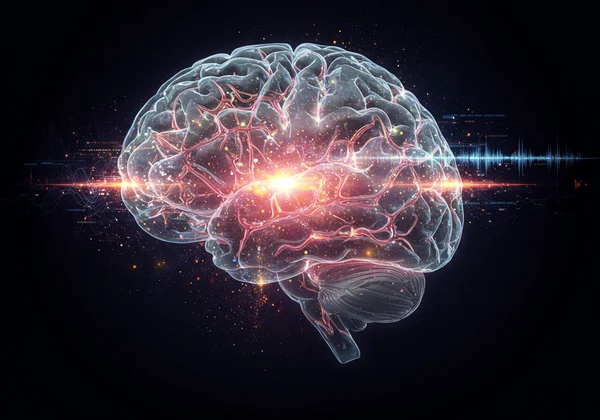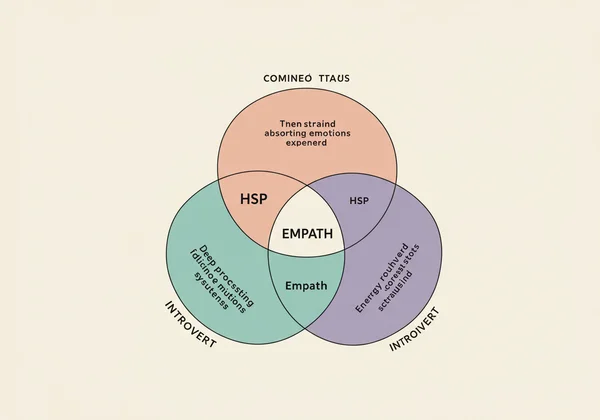Test HSP, Empatico e Introverso: Comprendere la Tua Sensibilità
July 27, 2025 | By Eleanor Reed
Ti senti sopraffatto dal costante trambusto del mondo? Ti scopri profondamente in sintonia con le emozioni degli altri, o hai semplicemente bisogno di tempo da solo per ricaricare le batterie? Se queste sensazioni ti risuonano, probabilmente hai incontrato i termini Persona Altamente Sensibile (PAS), empatico e introverso. Sebbene vengano spesso usati in modo intercambiabile, queste etichette descrivono aspetti distinti e affascinanti della personalità umana. Comprendere la dinamica tra PAS ed empatici è un passo cruciale verso l'autoconsapevolezza.
Allora, qual è la differenza? In questa guida, scioglieremo i fili, chiarendo le distinzioni uniche e le sorprendenti sovrapposizioni tra questi tratti. Esplorando cosa significa veramente ciascun termine, puoi ottenere una comprensione più profonda del tuo personale cablaggio e imparare a prosperare. Se sei pronto a esplorare la tua sensibilità, il viaggio inizia con la conoscenza. Puoi iniziare a scoprire i tuoi tratti con un test ufficiale PAS oggi stesso.

Comprendere il Tratto della Persona Altamente Sensibile (PAS)
Innanzitutto, stabiliamo un concetto fondamentale. Il termine "Persona Altamente Sensibile" non è solo un'etichetta informale; è un tratto della personalità identificato e ampiamente ricercato dalla psicologa clinica Dr. Elaine N. Aron. Non è un disturbo o una debolezza, ma un temperamento innato e distinto presente circa nel 15-20% della popolazione. Essere una PAS significa che il tuo sistema nervoso elabora gli stimoli fisici, emotivi e sociali in modo più profondo e completo rispetto alla maggior parte delle persone.
Cosa Definisce una Persona Altamente Sensibile? (Modello DOES)
La Dr. Aron ha creato un acronimo semplice ma potente, DOES, per catturare i quattro pilastri fondamentali dei tratti PAS. Se esibisci costantemente tutti e quattro, sei probabilmente una Persona Altamente Sensibile.
- D - Depth of Processing (Profondità di Elaborazione): Le PAS pensano profondamente a tutto. Elaborano le informazioni a un livello più complesso, collegando e confrontando spesso le nuove informazioni con le esperienze passate. Questo può portare a essere coscienziosi e perspicaci, ma anche suscettibili al rimuginio.
- O - Overstimulation (Sovrastimolazione): Poiché le PAS assorbono così tanto dal loro ambiente, possono essere facilmente sovrastimolate o sopraffatte. Luoghi affollati, rumori forti o anche una giornata frenetica possono essere molto più drenanti per una PAS che per una persona non-PAS.
- E - Emotional Responsiveness & Empathy (Reattività Emotiva ed Empatia): Le PAS provano le cose intensamente, sia emozioni positive che negative. Hanno un forte senso di empatia, spesso comprendendo e provando ciò che gli altri stanno attraversando.
- S - Sensitivity to Subtle Stimuli (Sensibilità agli Stimoli Sottili): Questo è un segno distintivo del tratto. Le PAS notano le piccole cose che altri potrebbero trascurare: sottili cambiamenti in una stanza, un leggero cambiamento nel tono della voce di qualcuno, o profumi e sapori delicati.
La Neurobiologia Dietro l'Alta Sensibilità
Non si tratta solo di sentimenti; è radicato nella biologia. La ricerca suggerisce che i cervelli delle PAS sono effettivamente cablati in modo diverso. Mostrano maggiore attività nelle regioni cerebrali associate all'empatia, alla consapevolezza e all'elaborazione delle informazioni sensoriali. Questa spiccata sensibilità nell'elaborazione sensoriale significa che i loro cervelli non filtrano gli stimoli quanto gli altri, portando a quell'esperienza del mondo più ricca e intensa.

Decodificare l'Empatia: Cosa Significa Veramente Essere un Empatico
Mentre le PAS hanno una forte empatia, essere un "empatico" va un passo oltre. Un empatico non si limita a comprendere o a provare per le emozioni di un'altra persona; spesso assorbe e prova quelle emozioni come se fossero le proprie. È un profondo livello di connessione emotiva che può essere sia un dono che una sfida.
Empatia Cognitiva vs. Emotiva in Pratica
Per comprendere gli empatici, è utile conoscere i due tipi principali di empatia:
- Empatia Cognitiva: È la capacità di comprendere la prospettiva o lo stato mentale di un'altra persona a livello intellettuale. Un terapeuta potrebbe usarla per comprendere il problema di un cliente senza rimanere emotivamente coinvolto.
- Empatia Emotiva: È la capacità di provare ciò che un'altra persona prova. È condividere la loro esperienza emotiva.
Mentre molte persone hanno un mix di entrambe, gli empatici sono definiti da un grado incredibilmente alto di empatia emotiva. Non si limitano a vedere che sei triste; sentono il peso della tua tristezza nel proprio corpo.
L'Esperienza di Assorbire le Emozioni Altrui
Per un empatico, entrare in una stanza piena di gente può sembrare come entrare in una "zuppa emotiva". Possono involontariamente assorbire lo stress, l'ansia o la gioia di chi li circonda. Questo è il motivo per cui gli empatici hanno spesso bisogno di significativo tempo da soli per distinguere i propri sentimenti da quelli che hanno assorbito dagli altri. Imparare a stabilire confini energetici è un'abilità di sopravvivenza fondamentale per loro.

Il Mondo dell'Introverso: Più che Semplice Timidezza
L'introversione è forse il più compreso di questi tre tratti, ma è anche comunemente etichettato erroneamente. La differenza fondamentale tra un introverso e un estroverso non ha nulla a che fare con la timidezza, la fiducia o le abilità sociali. Riguarda la gestione dell'energia.
Come gli Introversi si Ricaricano e Rispondono agli Stimoli
La definizione fondamentale di introverso è una persona che ricarica le proprie energie attraverso la solitudine. L'interazione sociale, specialmente in grandi gruppi, tende a prosciugare le loro riserve di energia. Gli estroversi sono l'opposto; ottengono energia dall'essere in giro con altre persone. Un introverso può essere perfettamente affascinante e coinvolgente a una festa, ma probabilmente si sentirà esausto dopo e avrà bisogno di tranquillità per riprendersi.
L'Introversione negli Ambienti Sociali e di Lavoro
In pratica, ciò significa che gli introversi spesso preferiscono conversazioni profonde uno a uno piuttosto che chiacchiere in una folla. Prosperano in ambienti di lavoro che consentono concentrazione tranquilla e progetti indipendenti. Uffici open space e riunioni di gruppo costanti possono essere particolarmente drenanti per un introverso, non perché siano antisociali, ma perché prosciugano costantemente la loro energia.
PAS vs. Empatico vs. Introverso: Sciogliere i Fili della Sensibilità
Quindi, come si collegano questi tratti? Rispondere a questa domanda è la chiave per la comprensione personale. Se stai cercando di capire dove ti collochi, puoi sempre fare un test di personalità PAS per maggiore chiarezza.
Sovrapposizioni Chiave: Dove Intersecano
È facile capire perché questi tratti vengano confusi, dato che c'è una significativa sovrapposizione:
- PAS & Introverso: Circa il 70% delle PAS sono anche introversi. Questo ha senso, poiché essere facilmente sovrastimolati (tratto PAS) porterebbe naturalmente a cercare ambienti tranquilli e meno stimolanti per ricaricarsi (tratto introverso).
- PAS & Empatico: Tutte le PAS hanno una forte capacità di empatia (la 'E' in DOES). Molti empatici sono anche probabilmente PAS, poiché il loro sistema nervoso è finemente sintonizzato sulle sottigliezze emotive.
- Tutti e Tre: Una persona può assolutamente essere una PAS introversa che è anche empatica. Questo individuo sarebbe profondamente riflessivo, facilmente sopraffatto, ricaricherebbe le proprie energie da solo e proverebbe le emozioni degli altri come proprie.
Differenze Definitorie: Caratteristiche Uniche di Ciascun Tratto
Nonostante la sovrapposizione, le cause principali sono diverse. Ecco il modo più semplice per distinguerli:
-
PAS riguarda l'elaborazione. La sensibilità di una PAS è ampia, coprendo sensi fisici (suoni, luci, texture) e segnali emotivi/sociali. È un tratto biologico legato a come il sistema nervoso assimila e riflette sul mondo.
-
Empatico riguarda l'assorbimento. La sensibilità di un empatico è principalmente emotiva. La loro caratteristica distintiva è l'assorbire i sentimenti degli altri. Mentre una PAS prova empatia per te, un empatico prova le tue stesse emozioni.
-
Introverso riguarda l'energia. L'esperienza di un introverso è definita da come guadagna e perde energia sociale. Non riguarda la profondità del sentimento, ma il costo dell'interazione.

Perché l'Identificazione Accurata è Importante per il Benessere
Conoscere il tuo tratto specifico – o la combinazione di tratti – è potenziante. Ti permette di smettere di chiedere, "Cosa c'è che non va in me?" e iniziare a chiedere, "Di cosa ho bisogno?"
- Se sai di essere una PAS, puoi gestire proattivamente il tuo ambiente per evitare la sovrastimolazione.
- Se ti identifichi come empatico, puoi concentrarti sull'imparare a stabilire confini emotivi.
- If you understand your introversion, you can honor your need for solitude without guilt.
Questa auto-conoscenza è il primo passo verso il vivere in armonia con la tua natura. Per compiere quel passo e scoprire i tuoi risultati, una valutazione affidabile è inestimabile.
Abbracciare la Tua Unica Sensibilità: Un Percorso da Seguire
Navigare le sfumature dell'essere una Persona Altamente Sensibile, un empatico o un introverso è un viaggio di auto-scoperta. Queste non sono scatole per imprigionarti, ma lenti per aiutarti a vederti più chiaramente. Comprendere che l'alta sensibilità riguarda l'elaborazione profonda, l'empatia riguarda l'assorbimento delle emozioni e l'introversione riguarda la gestione dell'energia ti permette di adattare la tua vita in un modo che onori la tua costituzione unica.
Abbraccia la tua vera natura e scopri le strategie che funzionano per te. Sei pronto a esplorare la tua sensibilità più a fondo? Il modo migliore per iniziare è con uno strumento affidabile. Fai il test gratuito PAS sul nostro sito per ottenere informazioni chiare e basate sulla scienza sulla tua personalità.
Domande Frequenti sulla Sensibilità e i Tratti della Personalità
Quali sono i principali segni di una Persona Altamente Sensibile?
I segni principali sono catturati dall'acronimo DOES: Depth of processing (elabori profondamente), Overstimulation (ti sovrastimoli facilmente), Emotional responsiveness (provi intensamente le emozioni) e Sensitivity to subtle stimuli (noti le piccole cose che gli altri perdono).
Una persona può essere PAS, Empatica e Introversa allo stesso tempo?
Sì, assolutamente. Infatti, è piuttosto comune che questi tratti coesistano. Una persona può essere introversa e anche PAS, e la stessa persona potrebbe avere una reattività emotiva così forte da identificarsi anche come empatica. I tratti non si escludono a vicenda.
La PAS è considerata neurodivergente?
Questo è un argomento sfumato. Sebbene la PAS implichi un sistema nervoso che funziona in modo diverso dalla maggioranza, è ufficialmente classificata da ricercatori come la Dr. Aron come un tratto della personalità, non una condizione medica o una forma di neurodivergenza come l'autismo o l'ADHD. Tuttavia, poiché descrive un cervello che diverge dalla norma, alcune persone nella comunità ritengono che rientri nell'ombrello più ampio della neurodivergenza.
Come posso confermare se sono una Persona Altamente Sensibile?
Mentre leggere articoli come questo è un ottimo inizio, il modo più efficace per confermare il tratto è attraverso un'auto-valutazione attentamente costruita. Il percorso più affidabile è fare un test ufficiale PAS basato sulla ricerca scientifica della Dr. Elaine N. Aron, che è progettato per valutare con precisione le caratteristiche fondamentali dell'alta sensibilità.